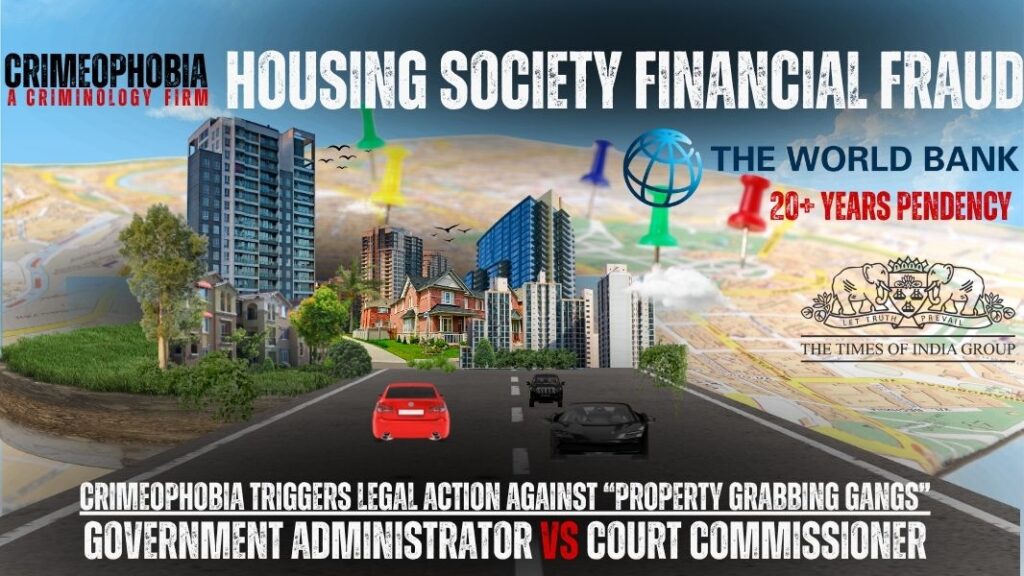
From Fake FIRs to Real Court Orders: Crimeophobia Ignites Court Commissioner vs Administrator Legal Face-Off against “Property Grabbing Gangs”
Mumbai: On 5th May 2025, a landmark order passed by the Bombay City Civil Court at Dindoshi, a Court Commissioner has been appointed to attach and seize critical documents from a co-operative housing society embroiled in decades of financial and administrative controversy. The court has also directed that hearings in the matter be conducted on a weekly basis, considering the gravity and longevity of the case, which has remained unresolved for over 20 years.
The execution petition, originally filed in 2008, sought enforcement of a 2006 Co-operative Court order that directed the society’s managing committee to allow inspection and provide certified copies of documents relating to its functioning. These proceedings followed after a fake FIR was registered in the year 2004 against the first managing committee of the society, which had primarily Times of India Group employees, including the then Managing Director’s family, made as the accused. Despite multiple notices and even arrest warrants issued against the managing committee that subsequently took over the society, they repeatedly failed to comply, prompting the latest judicial intervention.
The move was triggered after the victims exhausted all conventional remedies against what they described as a “highly corrupt” managing committee and handed over the case to Crimeophobia, a criminology and legal intelligence firm. The building, once widely referred to as the Times of India’s building due to the presence of multiple senior employees and even the then Managing Director’s family as residents, has been under scrutiny for what Crimeophobia experts now believe could be one of the most brutal financial frauds linked to a World Bank-sanctioned High Income Group housing project and in any of the cooperative housing society projects within India.
The roots of the controversy trace back to the first managing committee, which was booked under an FIR solely based on “oral evidence for financial fraud.” One of the accused committee members had requested access to financial documentary evidence—which was never provided. The complainants, who claimed to be government-appointed administrators, could not prove their credentials who now is referred to be an identity who impersonated as government official since Crimeophobia’s evaluation couldn’t find any of his photos or physical presence while the Police submitted their report stating he is dead without confirming if the death certificate is of the same person who is referred as the complainant. Following further detailed investigation, Crimeophobia also revealed that the supposed “Government Administrator” never existed with documented evidence backed by over 40 written confirmations from various government departments on official letterheads, each bearing stamps and signatures, confirming that the complainant was not a government employee and they had never authorized any individual to register an FIR.
Despite multiple directions from the Co-operative Minister, police and various court orders to release financial and accounting records, the successive managing committees refused to comply. Shockingly, some of these committees were even convicted and sentenced to civil imprisonment—three separate times—for non-compliance, but the judicial consequences had no effect on the defiant officials.
Victims of the earlier FIR eventually managed to secure a legitimate government-issued order for the appointment of a real administrator by MHADA. However, amid what appears to be high-level administrative corruption, resistance, and silence, the order was never implemented. Repeated attempts to engage with the Deputy Registrar of Co-operative Societies—whose jurisdiction includes the private building standing on MHADA land—yielded no answers. Officials reportedly refused to clarify why the government-appointed administrator has not used police powers to take control of the society which has been refusing to allow even Government Administrator to take over as duly appointed by MHADA. The Deputy Registrar also allegedly misbehaved with female officials who had gone to inquire about the case status, leading to a formal complaint being filed against him for outraging women’s modesty with the local Police and State of Maharashtra Women Commission—though this complaint too was suppressed, reportedly to protect “Property Grabbing Gangs.” Unfortunately, the State Commission also has their office in the same building due to which unduly influence is suspected.
Crimeophobia has been actively working for several years on exposing and dismantling such Property Grabbing Gangs operating across Mumbai, which are known to have deep-rooted nexus with various government departments handling residential and commercial properties. Various States have already initiated “Land Grabbing” Acts/Laws, however, the State of Maharashtra isn’t one of them. Crimeophobia’s investigations have consistently pointed toward collusion between rogue bureaucrats and local power centers aimed at usurping valuable real estate assets under false or manipulated claims.
With enforcement channels collapsing, Crimeophobia strategically turned to the Bombay City Civil Sessions Court for an alternative legal remedy using case laws and a criminological approach. The Hon’ble Court, acknowledging the seriousness of the case and the consistent failure of government departments, eventually passed a strong order appointing the Deputy Registrar as the Court Commissioner. The Commissioner has been instructed to inspect, seize, and deliver financial documents from the society to the rightful applicant, following which certified copies must be provided and compliance confirmed.
“This order finally triggers a long-awaited confrontation between a legally-appointed Court Commissioner and the so-called Government Administrator who failed to act for years,” said Criminologist Snehil Dhall, who has been arguing the case personally. “This is more than a fight over documents—it’s about holding a shadow system of corruption accountable,” stated M.P. Sahay (Advocate-on-Record, Supreme Court of India and Crimeophobia’s Board of Advisor), who argued in one of the hearings to secure the Order.
With weekly hearings now scheduled, the case is expected to intensify and could set a significant precedent on how judicial mechanisms can override bureaucratic deadlock and expose institutionalized corruption in co-operative housing frauds. Criminologist Snehil Dhall also suspects a major legal dispute could arise considering the government as appointed their Administrator to takeover while the Court has appointed their Commissioner for getting the same financial documents, but where would this end continues to be a mystery.
